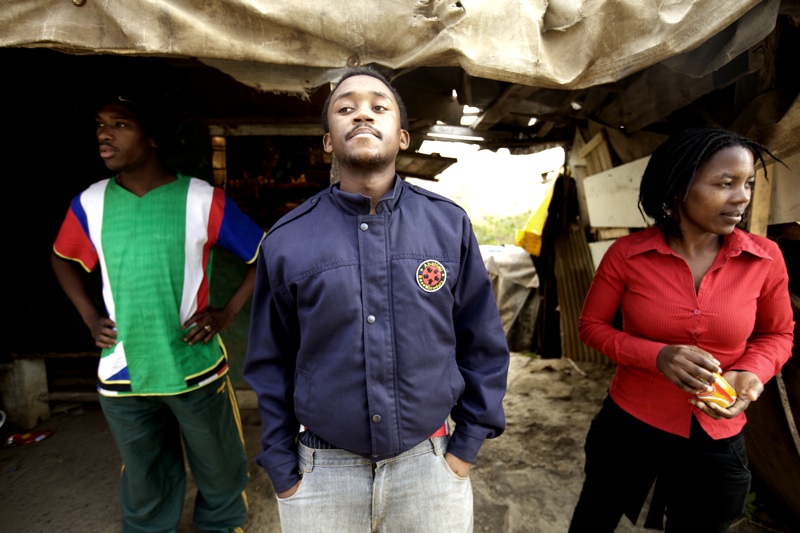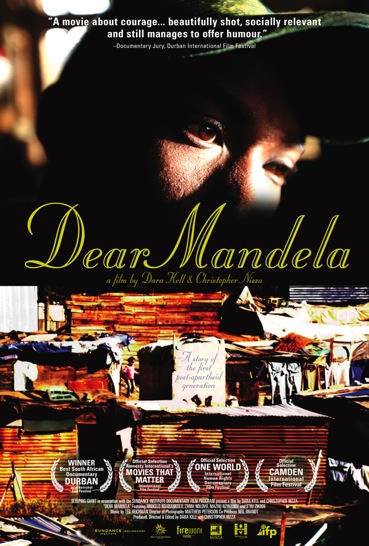
When the South African government begins ‘eradicateing the slums’, Mnikelo, Mazwi, and Zama refuse to be moved. Dear Mandela follows their journey from their shacks to the highest court in the land as they become leaders in a growing social movement.
Within the first minute of Wednesday’s 2012 presidential debate, President Obama mentioned ‘housing’. It is indeed high time that we had a wide and deep discussion about the U.S. housing crisis, the true dimensions of this crisis in terms of human rights, and what realizing the human right to ‘adequate housing’ would look like in one of the world’s wealthiest countries.
But when we think about terrible housing crises, our minds often wander to somewhere outside the United States – the lack of safe housing in Haiti, the crisis facing Roma in Europe or forced evictions in the Occupied Territories.
An award-winning documentary currently on a screening tour in the United States, Dear Mandela, shines a light on the dire housing circumstances affecting around 12 million South Africans, (2011 United Nations figure), through highlighting the work of Abahlali baseMjondolo.
 The shack-dwellers movement is arguably the largest social movement of the poor to emerge in post-apartheid South Africa, with an estimated 25,000 people represented from 64 different informal shack settlements. Abahlali baseMjondolo (the shack-dwellers movement), is fighting to secure the right to adequate housing as guaranteed by the Universal Declaration of Human Rights (Article 25), the Economic and Social Rights Covenant (Article 11) and the South African Constitution (Section 26).
The shack-dwellers movement is arguably the largest social movement of the poor to emerge in post-apartheid South Africa, with an estimated 25,000 people represented from 64 different informal shack settlements. Abahlali baseMjondolo (the shack-dwellers movement), is fighting to secure the right to adequate housing as guaranteed by the Universal Declaration of Human Rights (Article 25), the Economic and Social Rights Covenant (Article 11) and the South African Constitution (Section 26).
In South Africa, the number of informal settlements has grown from 300 in 1994 to 2600 in 2011. The housing backlog has grown from 1.5 million to 2.1 million in around the same timeframe. Despite the victory human rights activists hard won through dismantling the inhuman apartheid regime, much remains to be done in South Africa to fully realize human rights. South Africa is by no means alone – according to UN HABITAT’s 2003 global report on settlements, around 1 billion people now live in dire housing conditions, 32% of the world’s urban population.
Could 12 million people in the United States ever be affected by a housing crisis of the proportion affecting South Africa?
Prior to the current economic crisis, we tended to think our communities at home could not be affected by a crisis of this degree. Indeed, we have a surplus of homes in the U.S. with 18.5 million vacant in 2010, according to the U.S. Census. Yet, the U.S. foreclosure crisis has displaced nearly that same number of people. Banks have foreclosed on around 10 million homes since 2007, and it is estimated that another 8 – 10 million families will be affected before the foreclosure crisis is over.
Furthermore, according to U.S. Census figures, 3.5 million people in the United States are experiencing homelessness, (despite the millions of homes that are held vacant). Of course, in addition to those of us dealing with mortgages that cost more than our homes, an increasing number of us are struggling too with unmanageable rental costs, barely habitable or uninhabitable public housing, overcrowding, and often the ongoing threat of eviction that creates a real sense of instability.
In thinking about the suffering that has resulted because of the lack of progress in Haiti in the post-disaster reconstruction period, I began thinking about the post-Katrina reconstruction work at home. In New Orleans, the demolition of public housing complexes – many of which sustained only minor storm damage during Hurricane Katrina – displaced tens of thousands of people. Many of those displaced are still not settled in appropriate housing today.
On her 2009 fact-finding mission to the United States, the United Nations Special Rapporteur on the Right to Adequate Housing, Raquel Rolnik, highlighted the ‘disastrous impact of the demolition policy’ in New Orleans and urged our government to take action to ensure access to affordable and adequate housing in cities around the United States. Her visit, and some dimensions of the struggles for adequate housing at home, is documented in the moving film, ‘More than a Roof’.
Two things you can do today!
First, Dear Mandela is on a tour of US cities at the moment, with members of the shack-dwellers movement exchanging their stories with those of U.S. housing rights activists. It’s an inspiring story, (and I loved seeing Justice Albie Sachs in the S.A. Constitutional Court scene!), so if you can, go check it out dearmandela.com. If you feel like hosting your own screening you can get further information and a screening kit from [email protected].
While there are many facets to the housing crisis in the United States, all of which must be addressed for the human right to adequate housing to be realized, one particularly prevalent and continuing form is the foreclosure crisis, which is continuing to lead to the forcible evictions of mortgaged homeowners and renters alike. So second, join Amnesty International in calling on the U.S. government to take urgent action to prevent further entrenching the foreclosure crisis. We are asking the U.S. government to take the following immediate actions:
- Give serious attention to the growing call for a foreclosure moratorium and other forms of relief for those at risk;
- Establish a housing finance system that meets human rights obligations; and
- Implement protections to ensure that other actors, such as financial institutions, do not undermine or abuse human rights.
You can help by joining us in urging President Obama and the U.S. Congress to take immediate action by signing this petition.
I’m looking forward to seeing the award-winning film Dear Mandela when it reaches my part of the country, and at the same time, I’m wondering if we might draw inspiration to create another film highlighting the many housing rights issues here at home. Time for Dear Obama? I think so.
Amazing documentary! Everyone should watch it as it sheds light on a lot of problems. I'm sure we'll get a new perspective on things if we think about the things documented here.